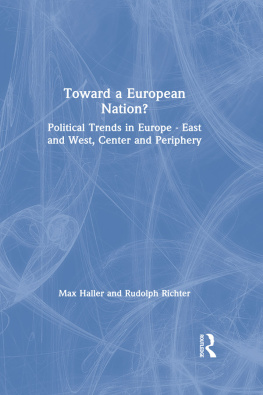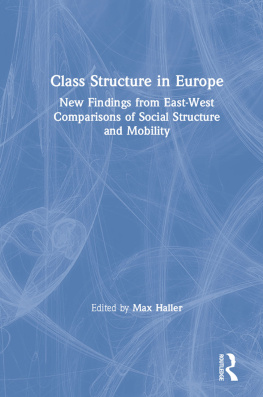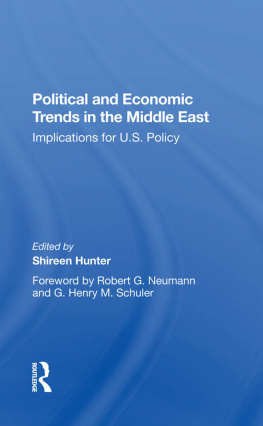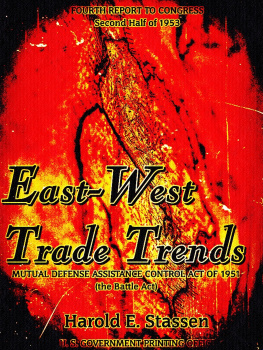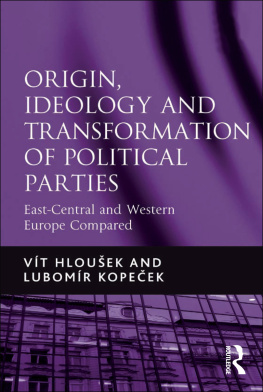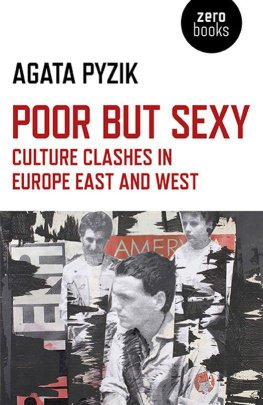Toward a European Nation?
Political Trends in Europe East and West, Center and Periphery
Working in concert for the first time, scholars from across Europe examine current processes of integration and disintegration at the level of individual national and federal states; regions; and the European center and periphery. The twelve chapters have been organized into three parts, treating, respectively: (1) trends in Western Europe; (2) developments in Eastern Europe; and (3) European integration overall. The contributions are based on papers originally presented at the First European Conference of Sociology held in Vienna in 1992, which brought together social scientists from every part of post-Soviet Europe.
First published 1994 by M.E. Sharpe
Published 2015 by Routledge
2 Park Square, Milton Park, Abingdon, Oxon 0X14 4RN
711 Third Avenue, New York, NY 10017, USA
Routledge is an imprint of the Taylor & Francis Group, an informa business
Copyright 1994 Taylor & Francis. All rights reserved.
No part of this book may be reprinted or reproduced or utilised in any form or by any electronic, mechanical, or other means, now known or hereafter invented, including photocopying and recording, or in any information storage or retrieval system, without permission in writing from the publishers.
Notices
No responsibility is assumed by the publisher for any injury and/or damage to persons or property as a matter of products liability, negligence or otherwise, or from any use of operation of any methods, products, instructions or ideas contained in the material herein.
Practitioners and researchers must always rely on their own experience and knowledge in evaluating and using any information, methods, compounds, or experiments described herein. In using such information or methods they should be mindful of their own safety and the safety of others, including parties for whom they have a professional responsibility.
Product or corporate names may be trademarks or registered trademarks, and are used only for identification and explanation without intent to infringe.
Library of Congress Cataloging-in-Publication Data
Toward a European nation? : political trends in
Europeeast and west, center and periphery / edited by
Max Haller and Rudolf Richter.
p. cm.
Papers collected in this volume were first presented at the
First European Conference of Sociology, held in Vienna,
August 26-29, 1992.
Published also as v. 24, nos. 1-3 of the
International journal of sociology.
ISBN 1-56324-384-9.
1. EuropeSocial conditionsCongresses. 2. Europe, EasternPolitics
and government1989Congresses. 3. NationalismEurope
Congresses. I. Haller, Max, Dr., II. Richter, Rudolf, 1952
III. European Conference of Sociology (1st : 1992 : Vienna, Austria)
HN372.T69 1994
306.094dc2093-48346
CIP
ISBN 13: 9781563243844 (hbk)
Contents
M AX H ALLER AND R UDOLF R ICHTER
S ALVADOR G INER
M ATTEI D OGAN
V OLKER B ORNSCHIER
M AURIZIO B ACH
J i M USIL
W LODZIMIERZ W ESOLOWSKI
I VAN B ERNIK
D OMINIQUE S CHNAPPER
P ETER E STER AND L OEK H ALMAN
J AP D RONKERS
A TTILA E RALP
J OHAN G ALTUNG
M AX H ALLER
Guide
Max Haller, professor of sociology at the University of Graz, received his Dr.phil. from the University of Vienna and his Dr.phil.habil. from the University of Mannheim (1984). His main research area is comparative social research on social structures and values. In 198689 he acted as president of the Austrian Sociological Association and in Vienna in 1992 he was a cochair of the Program Committee of the First European Conference of Sociology. He has published many articles in international social science journals, and his recent books include Klassenstrukturen und Mobilitt in fortgeschrittenen Gesellschaften (Frankfurt/New York, 1989) and Class Structure in Europe, (Armonk, 1990).
Rudolf Richter is professor and chair of the department at the Institute of Sociology, University of Vienna. His main research areas include life-style research, political sociology (political participation in environmental affairs), and family sociology, especially the changing of values and youth. In 1992 he was the chair of the Organizing Committee of the First European Conference of Sociology, and in 199093 he was the president of the Austrian Sociological Association. His recent publications include Familien in Wien und Budapest , ed. with L. Cseh-Szombathy (Vienna, 1993) and a series, Current Trends in European Sociology, published in Innovation in the Social Sciences.
Maurizio Bach is associate professor of sociology at the University of Constance, Germany.
Ivan Bernik is associate professor at the Faculty of Social Sciences at the University of Ljubljana, Slovenia.
Volker Bornschier is professor of sociology at the Institute of Sociology, University of Zurich.
Mattei Dogan is a professor at the Centre National de la Recherche Scientifique in Paris.
Jap Dronkers is a professor at the University of Amsterdam.
Attila Eralp is associate professor at the Department of International Relations, Middle East Technical University, Ankara, Turkey.
Peter Ester is professor of sociology and director of IVA, Institute for Social Research, Tilburg University, the Netherlands.
Johan Galtung is professor of peace studies currently residing in Paris.
Salvador Giner is a professor at the Institute of Advanced Social Studies in Barcelona.
Loek Halman is a research fellow at IVA, Institute for Social Research, Tilburg University, the Netherlands.
J I Musil is professor of sociology at the Czech Academy of Sciences and director of the Central European University Foundation in Prague.
Dominique Schnapper is a professor at Ecole des Haute Etudes en Scienees Sociales in Paris.
Wlodzimierz Wesolowski is a professor at the Institute of Philosophy and Sociology, Polish Academy of Sciences in Warsaw.
The papers collected here were originally presented at the First European Conference of Sociology, held in Vienna, August 2629, 1992, under the title Sociological Perspectives on a Changing Europe: Paradoxes of Socioeconomic, Political, and Cultural Transformation. The idea for this conference was originally developed by Max Haller (Graz) and David Lane (Cambridge) in the aftermath of an annual conference of the Austrian Sociological Association in Graz in 1987that is, even before the revolutions in Eastern Europe and the opening of the borders between East and West. In cooperation with about two dozen European national sociological associations, an international program committee was formed, with Giandomenico Amendola (Bari), Thomas P. Boje (Roskilde), Ayse Gnes-Ayata (Ankara), Michal Illner (Prague), Wladyslaw Kwasniewicz (Cracow), and Rudolf Richter (Vienna) as members, David Lane and Max Haller as cochairs. The committee met several times to discuss the structure of the conference. The Austrian Sociological Association, under its then president, Rudolf Richter, offered to host the conference and a local organization committee was formed, with Eva Cyba, Elisabeth Jandl-Jager, Max Haller, Helga Nowotny, and Ronald Pohoryles as members and Rudolf Richter as chair.
The conference was a considerable success. It was attended by around 650 participants from 27 European nations; more than 130 papers were presented. Sociologists from the smaller European nations were well represented at the conference, as were sociologists from Eastern Europe, including the Baltic states and Russia (thanks to funding support from the city and the Tourist Association of Vienna, the Austrian ministries of Science and Research and of Labor and Social Affairs, and the European Community).

